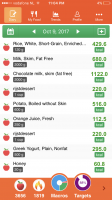Gadsie
Member
- Joined
- Jun 19, 2016
- Messages
- 288
This is a post f0r the ones into fitness, which I understand is a controversial topic in the ray peat community, but I thought this was interesting enough to share. I'm not really explaining anything new here, because it's already been talked about a lot on this forum, but the link to bulking has just never been made. Bulking is essentially eating at a caloric surplus while lifting weights in order to gain weight (muscle). It is generally accepted that there will always be some fat gain accompanying this muscle gain. The goal of everybody trying to build a better body is obviously to limit fat gain as much as possible. This is where I believe eating extremely low fat can be beneficial. When you're eating at, say, a 300 calorie surplus a day, 200 of them will go to muscle, and 100 to fat (the numbers are made up for the sake of explanation). However, when all of your excess surplus calories come from protein and carbohydrates, there will be a lot less fat conversion because there is much more energy lost in the conversion from carbs and protein to bodyfat (20-30%), than fat to body fat (2-3%).
This means that a very low fat diet basically gives you a buffer. You still benefit from your caloric surplus in terms of muscle building, but it limits fat gain.
When cutting on the other hand, I don't think it matters. When you eat at a caloric deficit, there is not much fat accumulation going on in the first place, so at that point it really is just about the amount of absolute calories you eat.
Now many people might think that eating low fat lowers testosterone which hurts your ability to build muscle, but I don't think this is the case. It is true that eating higher fat increases your testosterone a little bit (although only 10-15%), but it has been shown that this does not lead to more muscle growth. I think this may be because of androgen sensitivity increasing when your testosterone drops and vice versa. Higher testosterone will only lead to more muscle growth when it's in extreme amounts (steroids). But I lack the medical knowledge to confirm this.
Personally, I have been lean bulking for about 2 months now at ~3800 calories with only 10% coming from fat, and it seems to be going pretty OK. On an bulk a few years ago I followed WAPF with lots of cream etc, and I gained a fair amount of fat, that seems to be drastically less now despite eating roughly the same amount of calories.
This means that a very low fat diet basically gives you a buffer. You still benefit from your caloric surplus in terms of muscle building, but it limits fat gain.
When cutting on the other hand, I don't think it matters. When you eat at a caloric deficit, there is not much fat accumulation going on in the first place, so at that point it really is just about the amount of absolute calories you eat.
Now many people might think that eating low fat lowers testosterone which hurts your ability to build muscle, but I don't think this is the case. It is true that eating higher fat increases your testosterone a little bit (although only 10-15%), but it has been shown that this does not lead to more muscle growth. I think this may be because of androgen sensitivity increasing when your testosterone drops and vice versa. Higher testosterone will only lead to more muscle growth when it's in extreme amounts (steroids). But I lack the medical knowledge to confirm this.
Personally, I have been lean bulking for about 2 months now at ~3800 calories with only 10% coming from fat, and it seems to be going pretty OK. On an bulk a few years ago I followed WAPF with lots of cream etc, and I gained a fair amount of fat, that seems to be drastically less now despite eating roughly the same amount of calories.



